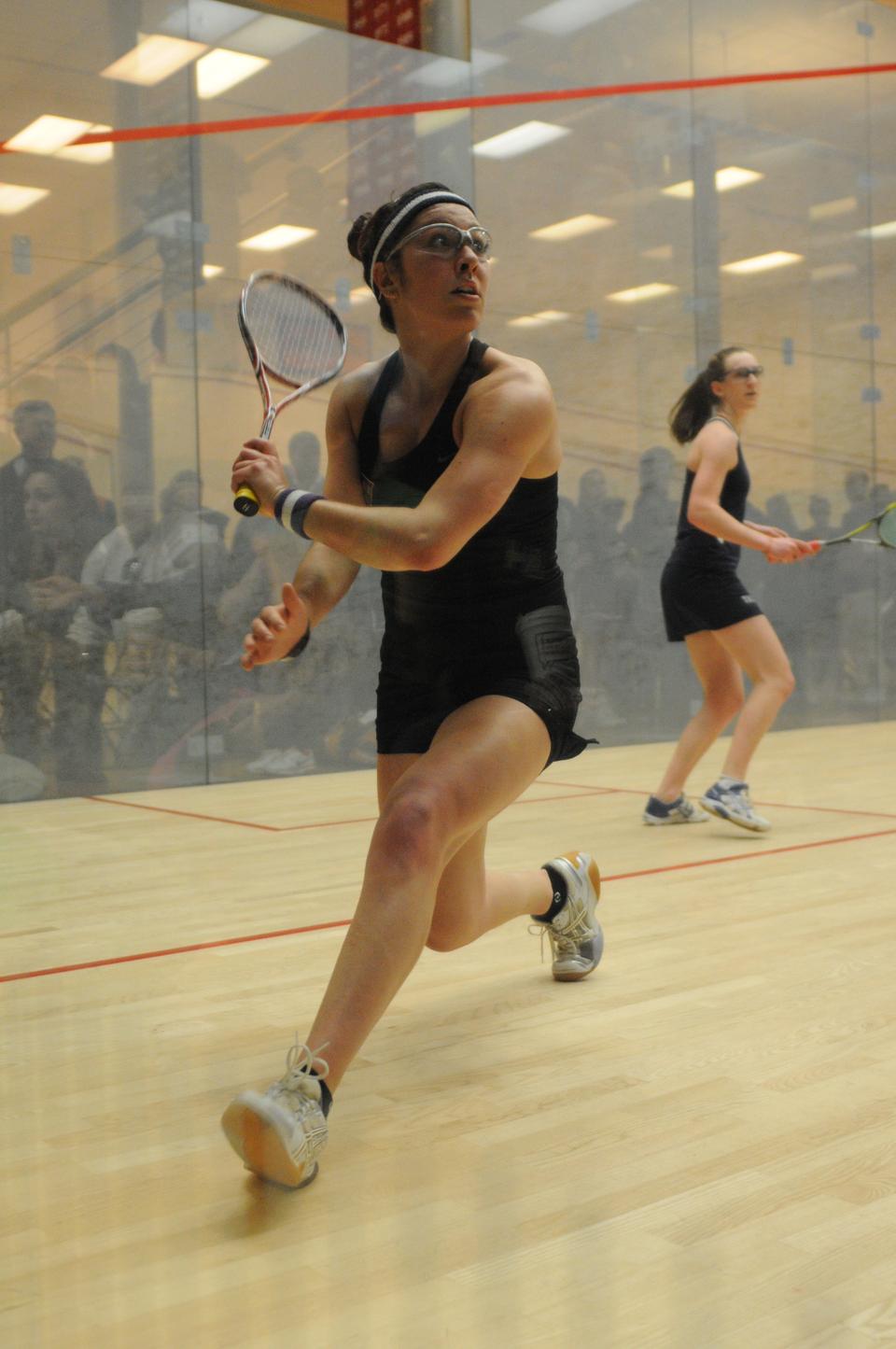
News
Cambridge Residents Slam Council Proposal to Delay Bike Lane Construction

News
‘Gender-Affirming Slay Fest’: Harvard College QSA Hosts Annual Queer Prom

News
‘Not Being Nerds’: Harvard Students Dance to Tinashe at Yardfest

News
Wrongful Death Trial Against CAMHS Employee Over 2015 Student Suicide To Begin Tuesday

News
Cornel West, Harvard Affiliates Call for University to Divest from ‘Israeli Apartheid’ at Rally
Female Athlete of the Year: Amanda Sobhy

For most athletes, a national championship title is the pinnacle of a career. For Amanda Sobhy, it is simply business as usual.
The sophomore won her second straight College Squash Association Individual National Championship this year, topping Kanzy El Defrawy of Trinity for the title.
The win was no surprise. Sobhy entered Harvard two years ago widely touted as the No. 1 women’s squash player in the United States and among the top 20 players in the world. Even before her first collegiate match, the Sea Cliff, N.Y., native had five professional titles to her name.
“She’s had incredible success,” co-captain Natasha Kingshott said. “Not only in college, but professionally. Having her on the team is a great thing for us since we can learn from her.”
Sobhy entered the college circuit primed for success. The pressure of living up to the hype does not appear to have fazed her. Since suiting up for the Crimson two years ago, Sobhy has taken the collegiate squash world by storm, winning all but one of her 30 matches by a perfect 3-0 margin.
“She’s just this powerful force at number one,” Kingshott said. “We all look up to her because she has so much talent and she works so hard. Her work ethic is really incredible.”
The lone game loss of Sobhy’s collegiate career—just a few weeks before her national championship victory—came at the hands of El Defrawy in Harvard’s regular season matchup against Trinity. Playing at No. 1, the sophomore found herself for the first time on the other side of an 11-6 decision, dropping the first game of the match.
Rattled but undeterred, Sobhy stormed back, dominating the next game, 11-2. She took the next two games with 11-6 and 11-3 wins to ultimately claim the match, 3-1.
“I was bound to lose a game,” Sobhy said. “It was going to happen. When it did, I was frustrated, but I also wanted to show people that it was kind of just, like, a fluke.”
The loss gave Sobhy extra motivation in the CSA Team National Championship, where she topped El Defrawy, 11-8, 11-7, 11-8, to clinch the Howe Cup for Harvard. The loss also provided some added incentive when she faced her opponent one last time that season, with both eyeing the individual title.
“It definitely gave me motivation to show people that losing a game was not really supposed to happen,” Sobhy said. “I just wanted to show that, even with the top people, I can still be 3-0. It was definitely motivation, and I’m so competitive, so I wanted to get that 3-0 win [at nationals].”
With her win against El Defrawy, Sobhy became the first player in over a decade to clinch back-to-back Ramsay Cups. But her quest is not over yet, as the sophomore hopes to become the first player in over 30 years to win four straight individual national titles. The only other player in women’s collegiate squash history to achieve such a feat was Gail Ramsay of Penn State, who took the individual titles from 1977 to 1980. Currently the head coach of Princeton women’s squash, Ramsay bears her name on the cup that Sobhy has now hoisted twice.
“She does feel a lot of pressure,” Kingshott said. “But she has such mental toughness that she handles the expectation of always winning at number one and winning her collegiate title again with so much grace.”
For all her collegiate success, Sobhy still remains a force to be reckoned with on the professional circuits, as she balances her time between academics, collegiate athletics, and the professional tour. The decision to come to Harvard meant putting aside much of her professional squash schedule for the next four years. The professional tour runs from September to May, directly coinciding with her college squash season. But despite the conflict, Sobhy does her best to stay competitive on the circuit.
“I think this year, I was a little more mature than last year,” Sobhy said. “I kind of learned from my mistakes last year, and I was able to map out a better schedule for my training and my performances, which helped. I think definitely this season I was playing better than last season.”
Most recently, Sobhy helped Team USA clinch the 2013 World Doubles Championship in mid-April. The sophomore teamed with 35-year-old Natalie Grainger to win the open division, topping the Canadian duo of Seanna Keating and Stephanie Hewitt in the finals.
The pair met just weeks earlier in the finals of the 2013 U.S. National Championship, where Grainger upset the top-seeded Sobhy. The tournament came just a week after the close of Sobhy’s college season.
“No one really tells you how hard it is to balance academics and athletics,” Sobhy said. “You just have to manage your time well at both. I love playing professional and college squash, and being a student, sometimes you have to sacrifice one thing for another. Sometimes you have to put more effort into academics and put squash on the side, and sometimes you have to focus more on the squash. It’s just basically all about time management. It’s pretty hard, though.”
As the top-ranked American in the world and with two collegiate individual titles under her belt, Sobhy seems to have found a way to be successful on both circuits.
“She’s just a phenomenal athlete,” Kingshott said. “She really is.”
—Brenna R. Nelsen can be reached at brennanelsen@college.harvard.edu. Follow her on Twitter @CrimsonBRN.
Want to keep up with breaking news? Subscribe to our email newsletter.
